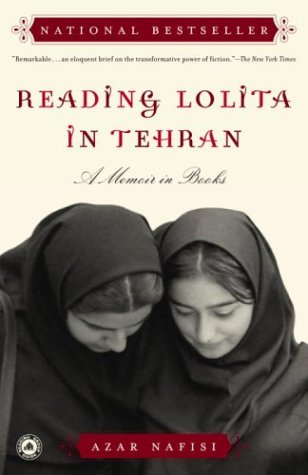 Reading Reading Lolita in Tehran (haha reading x2) is different from reading other novels. In the book, the women are analyzing literature and making connections and tracking themes and all that good stuff. However, as I read the novel, I am making annotations and drawing conclusions of my own. So, I find that a lot of the time I am analyzing the analyses of all the different women. DOUBLE ANALYSIS! Yeah, pretty crazy. All of these unique perspectives, as well as some of the literary analysis in Reading Lolita in Tehran (RLiT) have inspired me to write this post.
Reading Reading Lolita in Tehran (haha reading x2) is different from reading other novels. In the book, the women are analyzing literature and making connections and tracking themes and all that good stuff. However, as I read the novel, I am making annotations and drawing conclusions of my own. So, I find that a lot of the time I am analyzing the analyses of all the different women. DOUBLE ANALYSIS! Yeah, pretty crazy. All of these unique perspectives, as well as some of the literary analysis in Reading Lolita in Tehran (RLiT) have inspired me to write this post. The first section of RLiT is entitled Lolita and discusses the reaction of the women to reading works of literature by Vladimir Nabokov. The two they focus on are Lolita (obvi) and Invitation to a Beheading. One of the themes throughout the section focuses on imprisonment and identity. In Lolita, a twelve-year-old girl (Lolita) is seduced by a middle aged man named Humbert Humbert. He turns Lolita into his fantasy and in that process, confiscates her life. Her identity is relient upon him. She is his prisoner. The book is written from Humbert's perspective, so the readers image of Lolita is inextricably linked to that of Humbert. Quoting Nafisi, "Lolita on her own has no meaning; she can only come to life through her prison bars." Her own self image and perspective is through the lens of Humbert, which is incredibly sad (at least I think so).
 Craft-wise, Nabokov has triumphed in choosing Humbert as his narrator. By, seeing the story through his eyes, we are able to understand the degree of Lolita's imprisonment and its implications. A while ago in class, we briefly discussed "personal narratives," identity and the way we view ourselves. In terms of Lolita, it is almost as if Humbert has robbed her of the ability to formulate her own personal narrative and he is writing it for her, where she is his mistress in his sick fantasy. And that's all she is. Here, we can see how the choice of perspective gives some quality insight into the relationship between the characters. In the case of Lolita, it shows the twisted intimacy between victim and jailer.
Craft-wise, Nabokov has triumphed in choosing Humbert as his narrator. By, seeing the story through his eyes, we are able to understand the degree of Lolita's imprisonment and its implications. A while ago in class, we briefly discussed "personal narratives," identity and the way we view ourselves. In terms of Lolita, it is almost as if Humbert has robbed her of the ability to formulate her own personal narrative and he is writing it for her, where she is his mistress in his sick fantasy. And that's all she is. Here, we can see how the choice of perspective gives some quality insight into the relationship between the characters. In the case of Lolita, it shows the twisted intimacy between victim and jailer.
Nick, this is a great post. I really like your conversational tone; it works well for this kind of blog. Anyways, I definitely found myself connecting to the personal narrative stuff as well while reading the Lolita section. I think the parallel between Humbert's projection of his own perceptions of Lolita onto her identity and the oppression of Iranian women under the Islamic regime makes a case for the importance of a personal narrative, and the destruction that comes from denying it to someone. Perspective is definitely important to understanding Iran, just as it's important in understanding Lolita.
ReplyDeleteThanks Daniel!
ReplyDelete